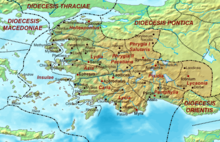Tabala (Ancient Greek: Τάβαλα), was a Roman and Byzantine town and a Bishopric in ancient Lydia (now Turkey). Tabala was on the Hermus River, and minted its own coins.[1][2] It was probably mentioned by Hierocles under the name of Gabala,[3] which is perhaps only miswritten for Tabala. It is even possible that it may be the town of Tabae or Tabai (Τάβαι), which Stephanus of Byzantium assigns to Lydia.[4]

Its site is located near Burgaz in Asiatic Turkey.[5][6]
Bishopric
editA see at Tabala was founded in the Roman era, and remains today a titular see of the Roman Catholic Church.[7][8]
Known Bishops
- Polycarp (Council of Chalcedon)[9]
- Johannes Peter Franziskus Ross (18 May 1928 Appointed - 26 Dec 1969)[10][11]
References
edit- ^ John Anthony Cramer, A geographical and historical description of Asia Minor, Volume 1 (The University Press, 1832) p454.
- ^ W. M. Ramsay, The Historical Geography of Asia Minor p132.
- ^ Hierocles. Synecdemus. Vol. p. 670.
- ^ Stephanus of Byzantium. Ethnica. Vol. s.v. Τάβαι.
- ^ Richard Talbert, ed. (2000). Barrington Atlas of the Greek and Roman World. Princeton University Press. p. 56, and directory notes accompanying. ISBN 978-0-691-03169-9.
- ^ Lund University. Digital Atlas of the Roman Empire.
- ^ Joseph Bingham, Origines Ecclesiasticae; Or the Antiquities of the Christian Church and Other Works: In Nine Volumes, Volume 3 (Straker, 1843)
- ^ Antoine Augustin Bruzen de La Martinière, Le grand dictionnaire géographique et critique, Volume 6(P. Gosse, 1736) p150.
- ^ Richard Price, Michael Gaddis, The Acts of the Council of Chalcedon, Volume 1 (Liverpool University press, 2005) p361].
- ^ Annuaire Pontifical Catholique, Year 1932.
- ^ Revue des Ordinations Épiscopales, Issue 1928, Number 51.
This article incorporates text from a publication now in the public domain: Smith, William, ed. (1854–1857). "Tabala". Dictionary of Greek and Roman Geography. London: John Murray.
38°37′11″N 28°48′39″E / 38.61964°N 28.81076°E